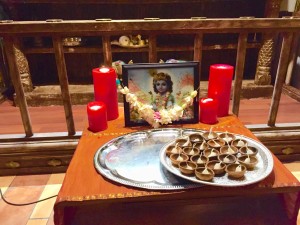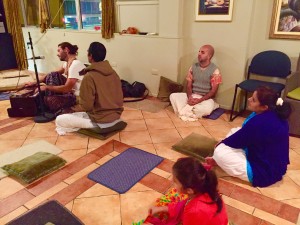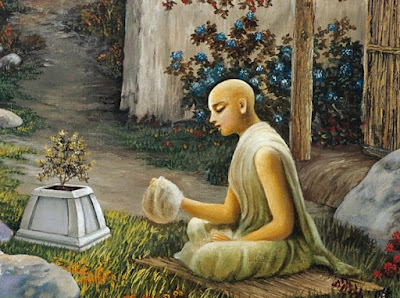HG Caitanya Nitai Prabhu / SB 10.85.14
CC daily 154 – M 6.226 – Appreciation of transcendence is often beyond material comprehension
→ The Spiritual Scientist
CC daily Podcast
Download by “right-click and save content”
Is the Ācārya Relative?
→ The Enquirer
I got into a terrible argument recently with a friend because of something I said.
It started when someone (on Facebook of course) asked me, “What do you have to say about Prabhupada’s condemnation of homosexual activity?”
In hindsight, I should have asked him to give examples and then addressed the examples one by one. I don’t think there would have been too many. Instead, as usual, I blurted out exactly how I feel – without pausing for diplomacy or tact or all that much sensitivity. “I don’t like it.”
My friend really hated that. He took “I don’t like it” to mean “It is wrong.” But “I don’t like it” doesn’t mean “It is wrong,” it means “I don’t like it.”
“Why would you not like it if its not wrong?” he asked.
I don’t like it because its very complicated. It is very complicated becaus it triggers a million reflexes that make it very difficult to clearly understand or explain.
In my original answer to the question, the next sentence after “I don’t like it” was a quick summary of why I don’t like it. Its another flaw of mine that I often make these summaries vastly too summarized. I skipped the step of explaining why I don’t like it (because it is so difficult to clearly understand and explain) and jumped to a summary of the essence of how I try to understand and explain it. I said, “I think its a product of the time, place and circumstance of his upbringing.”
My friend read this to mean, “I think Prabhupāda is an ordinary human being whose opinions are generated by the modes of nature and the reactions of karma.” That’s not what I meant. I meant that even Avatāra, Mahā-bhāgavata, Sad-guru appear within a certain setting in this world, and use what is at their disposal in that setting to communicate with the people in that setting and thereby bless them. Śrīla Prabhupāda appeared at the end of the 19th century and was educated by the British in Kalkatta, at Scottish Church College. As a result he was fluent in English and exposed to English victorian culture. I don’t think this is why he did not have a positive opinion of homosexuality. I think any orthodox, traditional non-tantric yogi wouldn’t go out of their way to have a positive opinion of homo- or hetero- sexuality. But I do think it is a very big part of the reason that his discriptions of homosexuality are distasteful to a majority of late 20th and early 21st century readers.
I was not expressing a denigration of Prabhupāda. After all, the next sentence I wrote in my original reply shows that my opinion of Prabhupāda is high and that I don’t like how people on either side of the issue use his comments to present him in a way that most people find low and ugly. I wrote, “I also think it is over-emphasized by people who want to denegrate him for one reason or another.”
My friend remains quite disappointed in me for having the opinion that material circumstances would have something to do with Prabhupāda – but I remain convinced that I am being realistic, not offensive. The mahā-bhāgavata who descends into this world takes the material circumstances he or she descends into and utilizes them for divinity in a way analogous to putting an iron rod into fire. The rod itself is not fire, but it becomes as hot and as bright as fire.
I think this is an opinion worth defending because I think the concept that “context is all-important” it is a central, fundamental principle of Vedic Hermeneutics (the Vedic system for understanding conflicting or complex statements). The context in which an ācārya makes a statement is an essential part of correctly understanding that statement. The statement’s relation to the ultimate śāstric context is another part, of paramount importance (since śāstra is the ultimate pramāṇa [authority] of our Gauḍīya Vedānta school; and the ācārya is an ācārya due to his or her relation to śāstra).
We can exploit the myriad connotations, denotations and possible contexts of words to derive almost any meaning from almost any statement. Hermeneutics (rules of understanding words) are therefore essential. The essence of Vedic Hermeneutics is that the original, intended meaning is understood by establishing the actual context of the words, and especially the context and intent of the speaker. In the case of an ācārya speaking with transcendental context, the context and intent of the śāstra he exemplifies and teaches is also an essential factor to be considered if we hope to have fully accurate understanding of the ācārya.
The meaning of śāstra or of śāstra’s teacher, the ācārya, is absolute, but the method through which śāstra and ācārya communicate is relative. This is why the same śāstra and same ācārya says many different things, often contradictory, to many different people in many different contexts and circumstances. The actual meaning of all these things is one absolute truth, but language and specifics through which that truth is expressed is relative to the person expressing it and the person it is being expressed to.
This does not mean that Prabhupāda is “an ordinary being whose words were not dictated by Krishna.” It means that Prabhupāda is a mahābhāgavata recieving diction from Krishna and expressing it to the world in context.
Śrīla Prabhupādāya daṇḍavat.
– Vraja Kishor dās
VrajaKishor.com
Tagged: A. C. Bhaktivedanta Swami Prabhupada, Absolute Truth, acarya, Guru, pure devotee, relative truth
Offering Ghee Lamps
→ Ramai Swami
At the Bhakti Centre on the Gold Coast, during Purusottama month, the devotees chant Krsna’s name, read from Bhagavad-gita and offer ghee lamps to the supreme Lord Krishna.
Don’t Chant Unconsciously
→ Japa Group
Mukunda Das Begins Service as New ECO-Vrindaban Co-Manager
→ New Vrindaban Brijabasi Spirit
By Madhava Smullen
Mukunda Das — ECO-V’s brand new co-manager along with Ranaka Das — moved to New Vrindaban on May 17th from Alachua, Florida with his wife Bhakti-lata Dasi, and has enthusiastically started serving in the community.
Born Marc Gauthier in Montreal, Canada, he was always an outdoorsman and interested in the deeper questions in life. As a young man, he worked at seasonal jobs doing tree-planting and apple-picking in Western Canada. In his free time, he would hike the Canadian Rockies in Banff National Park and reflect on how to find an engagement that would truly bring him satisfaction.
Meanwhile he also practiced Hatha yoga and studied Eastern philosophy with the Theosophical Society, which led him to Sri Aurobindo’s Bhagavad-gita. Finding it hard to understand, he went to another Gita he had gotten in college — Srila Prabhupada’s Bhagavad-gita As It Is.
“I still couldn’t understand, but the one thing that grabbed my mind like a catchy song was the name at the bottom of the cover,” he says. “I started reciting it constantly: A.C. Bhaktivedanta Swami Prabhupada; A.C. BhaktivedantaSwami Prabhupada.”
Soon after, in 1984 at the age of 22, he met an old friend who had joined the Hare Krishna movement, and told him that it answered all the questions they had been asking in college. Marc spent a few days in the temple, and after experiencing the peace it gave him, decided to move in.

First, though, he had to tell his girlfriend Bernadette, whom he had met a year and a half before and instantly clicked with. Bracing himself, he told her, “I’m going to live with the Krishnas.” Immediately, she responded, “Well, if it’s good enough for you, it’s good enough for me.”
The couple became Mukunda Das and Bhakti-lata Dasi. Over the next five years, she served as Lord Jagannath’s pujari, he cooked at Govinda’s restaurant, and they both collected funds for the Montreal temple, among other services.
In 1989, they moved to a devotee community in Mississippi, where Mukunda became a construction worker. From there, they moved to Prabhupada Village, North Carolina, and in 2001 to Alachua, Florida, where they remained until moving to New Vrindaban this year.
While in North Carolina, Mukunda got his State Contractor’s license and started his own construction company. Working with a special energy efficient construction technique using insulated concrete forms, he has since built most of the houses in Prabhupada Village, constructed a secure vault to store all of Srila Prabhupada’s original manuscripts at the Bhaktivedanta Archives there, and built many residential homes and some commercial buildings.
Interestingly, in the late ‘90s he also helped construct the houses at Balabhadra Das’s cow protection program ISCOWP in New Vrindaban using the same technique.
Always looking for ways to broaden his skillset, discover his full potential, and help others, Mukunda also took many personal development, communication, and leadership courses over the years. He completed a certification in life coaching at the Coaches’ Training Institute (CTI) in San Rafael, California, one of the first and most prestigious life coaching schools in the U.S., and has coached several clients including devotees, PhDs, and a CEO.
“I followed that with the CTI’s ten-month intensive leadership training program, which was life-altering,” Mukunda says. “It gave me a lot of my perspective on the necessity for community development, and inspired me to try to realize Srila Prabhupada’s desire for self-sufficient communities, which I call devotional Eco-Villages.”
On this mission, Mukunda discovered the Fellowship for Intentional Communities (www.ic.org) and took several of their courses on community building and conflict resolution. He also took classes in natural building techniques such as cob, straw-bale, and traditional timber frame. And he visited several successful intentional communities including the Farm in Summertown, Tennessee and O.U.R. Eco-Village on Vancouver Island, British Columbia.
“During my visits, I took the permaculture design certificate training, and had conversations with the communities’ founders to find out what worked, what didn’t work, what made them successful, and what the challenges were,” he says.
So when Mukunda learned that ECO-V was looking for a co-manager, it seemed like an opportunity he had to find out more about. After submitting a questionnaire to then chairman Navina-Shyam Das, he was invited to New Vrindaban to meet with the joint boards.
When the mutual decision was made for Mukunda to come on-board as ECO-V’s co-manager, he made arrangements and moved to New Vrindaban on May 17th this year.
His wife Bhakti-lata Dasi has moved with him. She runs the U.S. ISKCON Prison Ministry – which corresponds with inmates all over the U.S. and sends them Srila Prabhupada’s books — and will be relocating it to New Vrindaban.
The rest of Mukunda’s family is remaining in Gainesville, Florida. His youngest daughter, Ulupi, 21, is working in retail and is in the process of finding her career path. His older daughter Manjari, 27, works as a massage therapist and birth doula. His son-in-law Madhava – Manjari’s husband and your reporter on this story – also works for ISKCON New Vrindaban remotely as its communication department’s staff writer. And his grand-daughter and Manjari and Madhava’s daughter, Ambika, 11 months, mostly points at things and shouts, “Ga!”
Mukunda will start out at ECO-V by helping or overseeing a number of construction projects. These include completing the renovation of “the Green House,” now known as the “the Prabhupada House,” where he and his wife are living temporarily; coordinating with Vyasasana who is finishing renovations on the exterior of the Bahulaban ox barn; and renovating an office space for himself and his future team next to Ranaka’s office at the Valley Barn.
As co-manager, Mukunda is also assisting Ranaka Das in his service. “A large percentage of my service could be called Human Resources, or HR,” he says. “I’m assisting and communicating with the devotees engaged in various ECO-V services such as the ox training program and soon the cow protection program. I’m trying to hear their needs and ideas, come up with ways to make their service easier, and improve their overall service environment. And I’m interviewing applicants for ECO-V’s new organic garden and ox training manager positions.”
There are more long term projects too. ECO-V plans to cooperate with ISKCON New Vrindaban to build a Food Processing facility right next to the Garden of Seven Gates, which will ready produce for the Deity, devotee and restaurant kitchens, and dehydrate or freeze-dry excess produce so it doesn’t go to waste. Mukunda will also participate in the long term development of a devotional eco-village within New Vrindaban.
“Although I miss my family in Florida so much, I am thrilled to be in devotee association, using my full set of skills and then some, and being stretched into all the talents that Krishna seems to have given me over the years,” he says. “And I feel very, very grateful to ECO-V for that opportunity.”
Student Spotlight: Conor Jennings
→ TKG Academy



Twelve-year-old Conor Jennings has joined TKG Academy during the last school year and quickly won the hearts of his classmates. His gentle and respectful demeanor endeared him to his teachers as well.
Conor has gained his voice last year. He discovered the healing power of poetry as a venue for expressing his feelings. We were delighted to discover that he is an apprentice member of the Forthwrite National Youth Slams. He won a space on the team after placing runner up at Peaceful Vocations.
On June 27th, their team won First Place at the “Speak Up! Speak Out! Youth Poetry Slam 2015″. All their hard work is paying off!
This month, Conor will be traveling with the team to Atlanta for the International Youth Poetry competition. We wish him all the best in this exciting pursuit.
Govindas in Stockholm looking for a transcendental cook
Govindas…
→ Dandavats.com

Govindas in Stockholm looking for a transcendental cook
Govindas restaurant in Stockholm is the oldest vegetarian restaurant in Stockholm, existing since 1975. We are looking for a transcendental cook with at least 3 years experience as a head cook. We are searching for a dedicated devotee who is willing to become part of a sankirtan team, share our values of being ready for extra sacrifice in preaching through prasadam distributuon. We can offer a simple dwelling (accomodation) at our site and an honourable salary.
Read the entire article here: http://www.dandavats.com/?p=18242
Hare Krishna! Inking with the Supreme
In his 1885 essay Pancha…
→ Dandavats.com

Hare Krishna! Inking with the Supreme
In his 1885 essay Pancha Samskara: The Process of Initiation, he discusses the five purificatory processes from Prameya Ratnavali mentioned earlier in this article, two of which are tapa (defined by Baladeva Vidyabhushana as branding) and wearing tilaka markings. Yes, he acknowledges them as prescribed ways to sanctify oneself so that one’s true spiritual nature can develop. But far more forcefully, he condemns being concerned only with the external: “Tapa applies not only to the body, but also to the mind and the soul. If it is only physical, in the form of branding or stamping, then tapa has not actually taken place and religious practice becomes hypocritical.”
Read the entire article here: http://www.dandavats.com/?p=18237
Krishna conscious festivals on the Baltic Sea of Poland began…
→ Dandavats.com

Krishna conscious festivals on the Baltic Sea of Poland began (Album with 86 photos)
Indradyumna Swami: This year we began our 28th annual summer festival tour in the town of Dzwirzyno, Poland on the Baltic Sea coast. It began auspiciously with numerous people approaching the harinam party thanking us for bringing the festival to the town again. The festival crowd was big, as always, and they thoroughly enjoyed our new stage dramas. So, one down and 39 more festivals to go!
See them here: https://goo.gl/8NJXSG
Has our devotion calcified and become lifeless?
→ SivaramaSwami.com
The post Has our devotion calcified and become lifeless? appeared first on SivaramaSwami.com.
All Devouring Death
→ HH Bhakti Caitanya Swami
Kurma Rupa: A Life of Service to Krishna’s Cows and Devotees
→ ISKCON News

Kurma Rupa was born to Mexican parents and grew up in New York. At 21, he was drafted for the Vietnam War. “While I was in the army, I prayed for the first time in my life,” he recalls in the recent short film ‘My Part of the Bargain.’ “I prayed very intensely that, ‘My dear God, if you save me from having to go to war, then I will figure out how to serve you.’”
TOVP Daily Tour Diary Day 79 – Gita Nagari Retreat Stop
- TOVP.org
Gita Nagari, another one of Srila Prabhupada’s original farm communities/temples located in Port Royal, Pennsylvania, is home to the beloved Deities of Visnujana Swami, Sri Sri Radha Damodar.
These Deities traveled throughout North America many times in a Greyhound bus converted into a traveling temple, enjoying devotional festivals and the sweet kirtans of Visnujana Swami in cities across the country. They have been in Gita Nagari since the late 1970’s and continue to inspire whoever sees Them with Their mystical gaze.
We arrived in Gita Nagari from New Vrindaban on Friday, May 29th, Pandava Nirjala Ekadasi, only for a few hours to make a presentation at the weekend retreat there with Radhanath Maharaja and Giriraja Swami, attended by 300+ devotees from across the country. There was no time for an abhisheka or puspanjali for the Padukas and Sitari, and after setting up our banners and table, Radhanath Maharaja spoke about the TOVP, glorifying the project and requested devotees to give their financial assistance. Radha Jivan and Jananivas prabhus then spoke, further inspiring everyone. Devotees enthusiastically responded and the total pledges came to an amazing $765,000. All glories to Sri Sri Radha Damodar.
The post TOVP Daily Tour Diary Day 79 – Gita Nagari Retreat Stop appeared first on Temple of the Vedic Planetarium.
Parents are the First Teachers – TKG Academy
Next, the study of…
→ Dandavats.com

Parents are the First Teachers - TKG Academy
Next, the study of mothers, leading up to Mother’s Day. Mother Nrtya Kisori spoke about the importance of respecting women in Vedic culture.
Mother Ananda Lila read from “Honor Thy Mother”, delineating the 7 mothers in Vedic culture.
The last parent-teacher for the session was Nityananda Chandra Prabhu. He enlivened the class with his beautiful stories about Go-Mata, the sacred Mother Cow.
Read the entire article here: http://goo.gl/GPb33B
Rathayatra in Florence, Italy, June 27, 2015 (43 min HD…
→ Dandavats.com

Rathayatra in Florence, Italy, June 27, 2015 (43 min HD video)
Srila Prabhupada: The letters of the holy name have so much spiritual potency that they act even when uttered improperly. (Sri Caitanya-caritamrta, Antya-lila, 3.59)
Watch it here: https://goo.gl/gwEZuU
Hare Krishna! Krishna as King
Krishna is no ordinary ruler….
→ Dandavats.com

Hare Krishna! Krishna as King
Krishna is no ordinary ruler. Kings or presidents represent what is grand and powerful in this world. Yet even the finest and most awesome personality is only a small indication of the opulence of the Supreme Personality of Godhead. His very body is constituted of eternity, knowledge, and bliss. Though Krishna as Dvarakadhisha enjoys many sporting battles, He has no one to conquer and nothing to achieve, being always complete in Himself. He always knows exactly what to do in His regal duties in relationship to His citizens, ministers, and soldiers. His brows are never furrowed with the anxiety of diplomatic responsibilities. Though Krishna rules as an adult, He is in fact nava yauvanam, eternally youthful. According to Brihad-bhagavatamrita, by Sanatana Goswami, the king of Dvaraka has “all of the beauty of youth made even sweeter by traces of childlike innocence.”
Read the entire article here: http://www.dandavats.com/?p=18229
Daily Darshan – July 3rd, 2015
→ Mayapur.com
The post Daily Darshan – July 3rd, 2015 appeared first on Mayapur.com.
Hare Krishna! Why Krishna Appears as Jagannatha
I was born in a…
→ Dandavats.com

Hare Krishna! Why Krishna Appears as Jagannatha
I was born in a conservative Orissan Vaishnava family in Puri, on the east coast of India. The Supreme Lord Jagannatha and His devotees were at the center of my life. As a child, I played with dolls of Jagannatha, Baladeva (Balarama), and Subhadra, the deities in the famous Puri temple. I still remember how my mother gave me enormous plates of Jagannatha prasadam and told me to always remember the Lord. I saw how the simple and devoted Orissan people—even doctors, engineers, and scientists—never neglect to honor Lord Jagannatha. I watched how the king of Puri becomes a humble servant and sweeps the street before Jagannatha’s cart during the yearly Rathayatra, or festival of the chariots.
Read the entire article here: http://www.dandavats.com/?p=18226
Become refreshed!
→ KKSBlog
(Kadamba Kanana Swami, 21 November 2012, Cape Town, South Africa, Evening Lecture)
 Krsnadas Kaviraj Goswami describes how the tongue is desert-like… always dry and in constant need of an endless flow of refreshing water, in the form of the Ganges.
Krsnadas Kaviraj Goswami describes how the tongue is desert-like… always dry and in constant need of an endless flow of refreshing water, in the form of the Ganges.
Just like how the Ganges pours refreshing transcendental water on the desert-like tongue, in the same way, the tongue always has to be engaged in chanting the name, fame and glory of Krsna.
Whenever we are not chanting then that desert-like state is experienced… it is described like that. In other words, there will be something lacking, something incomplete, something just not right with the situation.
You know what I’m talking about, that feeling of incompleteness which is there everyday! That will be there when we are not absorbed and then there will be no fulfillment. Everyone experiences that lack of fulfillment in life and we are always looking at a reason… something that is holding us back… some relationships are not working out… some place is not working out… some financial situation is not working out… our health is not working out…but all the obstacles are actually illusory.
Mula-Ramayana: A Vaisnava Samskrita Reader
In order to fill a…
→ Dandavats.com

Mula-Ramayana: A Vaisnava Samskrita Reader
In order to fill a long felt lacuna for those who wish to start reading Samskritam, a new edition of the Mula-ramayana has just been released by Bhakta Demian Martins, an ISKCON brahmacari who holds a Ph.D. in Samskrita from the Benares Hindu University.
Read the entire article here: http://www.dandavats.com/?p=18223
Purushotama Month Preaching Programme at Sri Jagannatha Mandir,…
→ Dandavats.com

Purushotama Month Preaching Programme at Sri Jagannatha Mandir, ISKCON Malaysia (Album with 103 photos)
See them here: https://goo.gl/4sBX6Q
The Glories of Purushottama Month (Maas)
- TOVP.org
The month of Purushottama is a highly sacred month and beneficial to making a donation to the TOVP.
Lord Krishna in Goloka speaking to Lord Vishnu Who has brought the personified extra month (Adhik Maas) to His realm for shelter:
“An unfortunate ignorant man, who does not perform any japa, does not giveany charity, does not pay respect to Lord Sri Krishna and His devotees, does not behave properly to brahmanas, makes enmity with others and who blasphemes the Purushottama month will go to hell for an unlimited period.”
Lord Sri Krishna continued, “How can a person make his life successful unless he performs devotional service in this Purushottama month? A person who is fully engaged in sense gratification and does not give any special importance to this sacred month becomes the best candidate for hell.”
“All human beings should perform some devotional service in this Purushottama month by:
- Worshipping Me, Sri Krishna, by chanting My holy name
- Study of Srimad Bhagavatam and Bhagavad-gita, particularly Chapter Fifteen, Purushottama Yoga
- Giving in charity
- Offering ghee diya (lamp) daily
The post The Glories of Purushottama Month (Maas) appeared first on Temple of the Vedic Planetarium.
22.06.2015 Moldova. Class “The Cultural Conquest”
→ Gouranga TV - The Hare Krishna video collection
22.06.2015 Moldova. Class “The Cultural Conquest” HH Indradyumna Swami
Accepted and Resented Restrictions
→ ISKCON News
What’s In That Punch?
→ ISKCON News
Govardhan Seva
→ ISKCON News
BBT Africa Reports Exciting Year of Increased Outreach
→ ISKCON News

While it may be turning up a little late, the BBT Africa’s recently released 2014 report shows encouraging growth in outreach – especially for a branch of the Bhaktivedanta Book Trust established just five years ago to better deliver Prabhupada’s books to the African Continent. “The continent has recorded amongst its best book distribution scores ever in 2014,” says managing trustee Govardhana Das.
Protected: Inside Out
→ The Enquirer
Donor Appreciation Dinner
→ TKG Academy
When we called to invite H.H. Kesava Bharati Das Goswami Maharaja to join us for the Donor Appreciation Dinner, he said it should be “short and sweet” and short and sweet indeed it was. The Sanctuary was beautifully decorated and elegantly arranged. The program began with a lively kirtan, led by all the attending children. Students’ presentations then followed. Children, representing each class, shared their learning and personal experiences at TKG Academy. They beautifully described the highlights of their school-year and their realizations of what gains they have made emotionally, spiritually and academically in the course of their education.
Mother Gopi-gita then emphasized the importance of our Gurukula education and of our donor family. She encouraged each donor to suggest another friend to join our donor base so that we can meet our goals for 2015.
H.G. Nityananda Prabhu stressed the value of the unique opportunity our children are getting in this school and again reiterated the value of our supporters, our donors.
A sumptuous feast was then served by the Upper Elementary students. They also handed each family a flower pot, personally painted and decorated by TKG Academy students, with the inserted sign: “Thank you for helping me grow”.
When everything is destined how can we have free will?
→ The Spiritual Scientist
Answer Podcast
Download by “right-click and save content”
How was Kunti ever truthful when she lied to conceal Bhima’s identity?
→ The Spiritual Scientist
From Abhiram Gopal Prabhu:
In Kunti’s character in video 2 in the Mahabharata Characters Course, in the same video you mentioned how she said that Bhima has mantras to kill the demon in ekachakra in order to hide revealing their identity and then you mentioned she had never spoken untruth and therefore Draupadi had to marry all 5 sons since it came from her mouth.
Answer Podcast
Download by “right-click and save content”
Why was there ajnata vasa in Mahabharata, but not in Ramayana?
→ The Spiritual Scientist
Answer Podcast
Download by “right-click and save content”
Venkatesh Stotra 5 – Krishna’s availability for others doesn’t make him unavailable to us
→ The Spiritual Scientist
Holy Name Meditation Podcast
Download by “right-click and save content”
CC daily 153 – M 6.225 – Urgency to honor prasad can be due to sense gratification or due to spontaneous devotion
→ The Spiritual Scientist
CC daily Podcast
Download by “right-click and save content”
Bhagavatam-daily 256 – 11.12.13 – Devotion transcends mundane morality
→ The Spiritual Scientist
Bhagavatam-daily Podcast
Download by “right-click and save content”
Ancient Cloning
→ The Enquirer
Some time later those sages began to discuss things, sitting on the bank of Sarasvatī River after having performed their daily rituals and baths. They had noticed that social problems were on the rise. “Maybe,” they said, “by killing the king we’ve left the leaderless people as prey for dangerous criminals?”
Clouds of dust billowed here and there, probably raised by bands of thieves galloping everywhere as they plundered the people. The sages moved to destroy the criminals just as they had destroyed the king, but when they approached they realized that the citizens themselves had become criminal and were plundering each other. The whole populate had become like thieves in the absence of a king’s governance. If they killed the criminals, there would be almost no one left!
“Wise philosophers,” they thought, “see everything as being equal, and therefore remain neutral and uninvolved. But if this neutrality causes them to ignore the needy, their spirituality is lost like water leaking from a cracked pot.
“The flawlessly heroic philosopher-kings of Aṅga’s dynasty are devoted to All-Attractive Keśava. They should not be allowed to disappear.”
To restore Aṅga’s dynasty, the sages rapidly catalyzed the material in the thigh of Vena’s preserved corpse, and created a very small human. His body was black as a crow, with short arms and legs, big jaws, blunt nose, red eyes, and copper-red hair.
He humbly bowed to the sages, asking, “What would you have me do?”
“Niṣīda” they replied, indicating that he should sit, wait, and tolerate his difficult fate. Later this person became known as Niṣāda. His descendants formed the forest-dwelling nomadic mountain-tribes known as Niṣādā. Niṣāda absorbed all the ghastly calamities of Vena. Purifying the corpse.
Then the learned sages catalyzed the material in the arms of the lifeless king and created a couple. The sages were very satisfied because they knew that this couple was an expansion of the All-Attractive. “He is an expansion of All-Attractive Viṣṇu, the sustainer of the world,” they said. “And she is the power of Lakṣmī, who is inseparable from that Supreme Person. We name him Pṛthu, expansive, because his fame as the greatest emperor will expand far and wide among kings. We name her Arci, splendid, because her smile is radiant, and her goddess-qualities outshine the beauty of the most beautiful ornaments. She will be like the sunrise and he will be like the earth. He is directly a fragment of Hari, born to protect the world. And she is certainly his dedicated power, Śrī, taking birth because she is inseparable from him.”
– Translated from Śrīmad Bhāgavatam (4.14.36 ~ 4.15.6)
by Vraja Kishor dās
VrajaKishor.com
Tagged: arci, cloning, prthu
TOVP Daily Tour Diary Days 77-78 – Our Visit to New Vrindaban
- TOVP.org
New Vrindaban is famous throughout ISKCON as being Srila Prabhupada’s first farm project, named after the holy dhama. Like other farm projects and temples, it was given the nomenclature “New” to link it to its origin. Srila Prabhupada even said there was no difference between the two, Vrindaban and New Vrindaban. The presiding Deities of Radha Vrindaban Chandra, Srinathji and Gaur Nitai are stunning. The larger than life Deities of Lord Nrsimha and Prahlad Maharaja are astounding. Lord Jagannatha, Lord Balarama and Lady Subhadra also have a separate altar, as do the Six Goswamis.
We arrived from Pittsburgh on Wednesday, May 27th in time to honor lunch prasadam at the home of Srila Prabhupada’s disciple Nityodita prabhu and his wife Padma, and were pleased to have Malati prabhu in our midst. Gopisa prabhu and other senior Srila Prabhupada disciples were also present. From there we went to the temple to begin making arrangements for the TOVP presentation that evening.
About 75 devotees assembled for the TOVP presentation. During kirtan there was an abhisheka of the Padukas and Puspanjali, after which the program began with Radha Jivan and Jananivas prabhus speaking about the TOVP project. Many devotees came forward to make pledges, despite this being a farm community. By the end of the pledgeing almost $115,000 was raised.
On Thursday, May 28th Jananivas was given a tour of Prabhupada’s Palace and other places in New Vrindaban. He was very pleased to get an opportunity to come to one of the original temples in the Western world established by Srila Prabhupada.
The post TOVP Daily Tour Diary Days 77-78 – Our Visit to New Vrindaban appeared first on Temple of the Vedic Planetarium.
Please Join The Japa Group
→ Japa Group
This Sunday – July 5th, 2015 — Associate with Guest Speaker His Holiness Bhakti Raghava Swami
→ ISKCON Brampton
Bhakti Raghav Swami
Sunday Love Feast for All | ||||||||||||||||||
| ||||||||||||||||||
| ||||||||||||||||||













 Kirtan with Hladini Kirtan Band at your home
Kirtan with Hladini Kirtan Band at your home Sunday School
Sunday School Gift Shop
Gift Shop